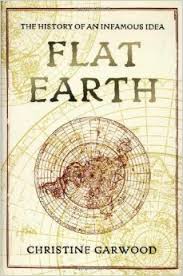This article was published in Scientific American’s former blog network and reflects the views of the author, not necessarily those of Scientific American
When I'm reading creationist textbooks, one thing I'm grateful for is that they're not written by flat-earthers. One wonders why they're not: after all, a literal reading of the Bible points very much to the idea that the earth is, indeed, a plane rather than a sphere. But some ideas are so difficult to sustain in the face of plain scientific evidence that even people who, in all seriousness, claim that every living thing on Earth descends from the inmates of a single wooden boat which survived a violent global flood, can't bring themselves to believe it. Really, did anyone post-Renaissance ever seriously believe that nonsense?
According to Christine Garwood's remarkable book Flat Earth: The History of an Infamous Idea: yep. They surely did.
On supporting science journalism
If you're enjoying this article, consider supporting our award-winning journalism by subscribing. By purchasing a subscription you are helping to ensure the future of impactful stories about the discoveries and ideas shaping our world today.

Credit: Pan MacMillan Publishing
Oh, it wasn't the majority of the early Christian church leaders, mind – they were fine with the whole globe thing. Garwood also gently debunks the notion that everyone in Columbus's day was convinced he was a madman who was going to go sailing right over the literal edge. No, they had other odd (and often entertaining to us modern folk) ideas. It's nice to see the old tall tales cut down to size. Really, it doesn't become us to view most of our predecessors as ignorant fools.
But if it's ignorant fools you're after, don't despair: you'll meet a few. Garwood introduces us to the Christian outliers who wanted their Earth served up like a plate. You'll also get to go inside an American city founded (in part) on flat earth belief. (And no, that wasn't some mid-nineteenth century silliness. It happened in the early 20th century.)
Garwood shows the arguments over the earth's rotundity that irritated Charles Lyell, and got Alfred Russel Wallace sucked into a quagmire of a bet in the hopes that winning it "may stop these foolish people." Flat-earthers, it turns out, were just as impervious to evidence as our modern creationists. History repeats. That's one reason this book makes such valuable reading.
We also meet a doggedly-determined old man who ran a flat earth society from his sickbed, and get some insight into the motivations for such beliefs. While giving no quarter to their incorrect ideas, Garwood does paint these Don Quixotes with a deft and sympathetic brush. We feel for them, even as we shake our heads over their sadly-mistaken beliefs.
And to top it off, we get to meet a zany bunch of tricksters who used a claim of flat-earth belief to keep scientists on their toes.
This is a thoroughly enjoyable read, and a valuable one, reminding us that people are often smarter than we think, were less ignorant in ages past than we believe them to be – and that mistaken notions can crop up for stubborn reasons even in enlightened ages. My only gripe with it is that I wanted more! We can haz sequel, plz?